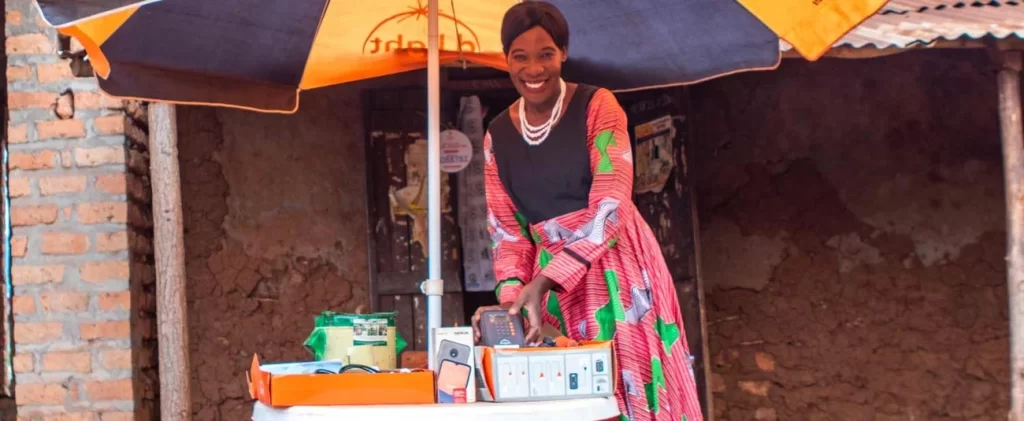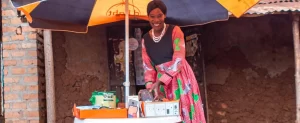
Grace Akingurwaruh poses with a coal-efficient stove and other products she learned to sell via AfDB-financed Green Energy for Women and Youth Resilience project. Almost 75% of project participants were women.
International Day of Clean Energy January 26th: AfDB promotes women’s empowerment through sustainable energy business development

Grace Akingurwaruh poses with a coal-efficient stove and other products she learned to sell via AfDB-financed Green Energy for Women and Youth Resilience project. Almost 75% of project participants were women.When Grace Akingurwaruh signed up to become a seller of coal-efficient, improved-cooking stoves, she had no idea that she’d be successful enough to purchase her first smartphone – a godsend which enables her to remain in regular contact with her customers and get new business.
Akingurwaruh is a farmer in Hoima, Uganda, a four-hour bus ride from the capital Kampala. The 40-year-old says she was looking for ways to increase her monthly income when a neighbor told her about an African Development Bank-financed training program promoting clean energy businesses like selling stoves that retain heat longer than traditional stoves or open fires.

“They taught us how to make business, so when we finished the training, I started advertising…At times I can have customers that want to buy five or more stoves to put in their shops. So, I [give them] a discount. That’s why I have managed to sell more than my colleagues,” Akingurwaruh said of how she applied the knowledge she learned in the Green Energy for Women and Youth Resilience project.
Financed by the Bank’s Africa Climate Change Fund, the programming was organized by civil society organizations AVSI Foundation and CIDR Pamiga in Uganda.
Akingurwaruh says her roughly 22 percent commission on sales of coal-efficient stoves enabled her to not only buy a smartphone but also a goat – another source of income and nutrition for her family. She is now working as a senior agent for the same company she was linked to through the project and oversees a team of 5 youth agents. She not only sells directly to customers but also earns commissions from the sales generated by the agents she supervises.
Akingurwaruh is one of more than 2,300 people considered sales agents and retailers and participants in the Green Energy for Women and Youth Resilience project. AVSI Foundation says 75% of these beneficiaries are women and young girls aged 18 or above and that the initiative through its sales training and outreach also provided clean cooking technologies and renewable energy solutions for lighting to more than 55,000 new customers.
“By connecting civil society organizations like AVSI Foundation to funding opportunities within the Bank, we have delivered sustainable energy solutions that have transformed lives in Uganda. This collaboration has led to the empowerment of communities, enabling businesses to thrive and households to access clean, reliable power,” said Dr. Martha Phiri, the Bank’s Acting Director of the Gender, Women and Civil Society Department.
About 250 kilometers north of Hoima in the city of Aura, training graduate Gloria Dunia sources coal-efficient stoves from a massive container, then carries them to her roadside stand to sell to passersby.
“I have been trained on customer service and entrepreneurship, and this has greatly helped me,” Dunia said.
Overall, the project supported communities in 14 districts across Uganda and 16 counties in Kenya on how to transition to low-carbon development and to scale up climate finance across through the promotion of jobs from micro, medium and small enterprises in the sustainable energy sector.
The Africa Climate Change Fund also noted the project strengthens the financial service provider capacity to deliver sustainable energy finance as well as improve availability and accessibility of energy products for communities.
Maria Ossola, the project coordinator with the AVSI Foundation, said that the project permitted them to discover the key role that entrepreneurs and the private sector plays in promoting clean energy.
“Through the Green Energy for Women and Youth Resilience project, we gained invaluable knowledge about the critical importance of private sector partnerships in achieving universal access to clean energy. We invite like-minded companies and financial institutions to join us in advancing this mission,” said Ossola.
Clean cooking is one of the African Development Bank Group’s priority areas. In May 2024, the Bank pledged $2 billion over 10 years towards clean cooking solutions in Africa – a move towards saving the lives of 600,000 mainly women and children estimated who die each year from the effects of secondary smoke from partial combustion of biomass, fuel wood and charcoal.
The Bank is also a key organizer of The Mission 300 Africa Energy Summit(link is external), scheduled for 27 and 28 January in Dar es Salaam, Tanzania. It will bring together cross-sector leaders, decision makers in the public and private sector sharing a passion for boosting access to electricity to more homes and businesses across Africa.
The Government of Tanzania is hosting the event in partnership with the African Union, the African Development Bank Group, and the World Bank Group. At this two-day summit, government officials, business leaders, funders, and community organizations will chart a path towards Mission 300’s ambitious goal of bringing power to 300 millions Africans by 2030.



